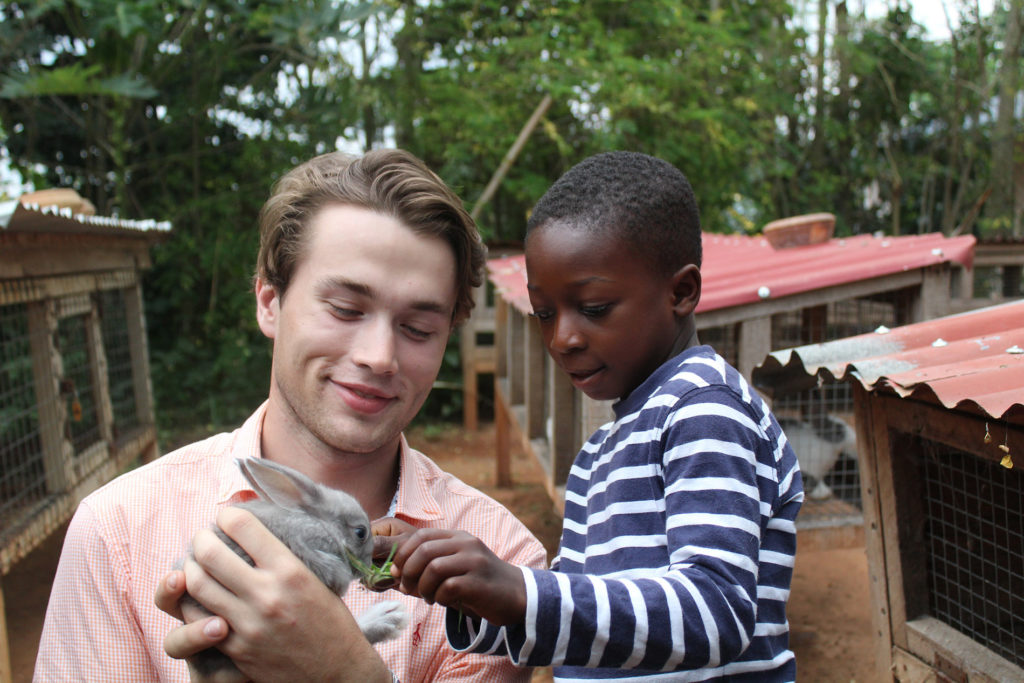Borlaug Institute seeks applicants for agriculture education fellowship in Ghana
Applications due Feb. 1 for 2021-2022 school year
A new program of the The Norman Borlaug Institute for International Agriculture at Texas A&M University seeks to reduce hunger and poverty in rural Ghana through agricultural education. Program organizers are looking to the agricultural community in the U.S. to help them do it.

The International Agricultural Education Fellowship Program, IAEFP, is seeking applicants for its upcoming agriculture education fellowship to Ghana. Selected fellows will function as agriculture teachers, Extension agents and 4-H advisors to help support agricultural education in rural Ghanaian communities during the 2021-2022 school year.
Applications are due Feb. 1. Nine applicants will be selected. More information on the application process, and applications forms, can be found online.
Jessica Spence, IAEFP program coordinator at the Borlaug Institute, said all fellows will be working in the classrooms with local teaching partners. However, the details of each fellow’s experience will be unique based on the needs of the community in which they are placed.
“Fellows will teach their students during the day and have a get-together with the local farmers for an Extension training in the afternoon or on Saturdays, for example,” she said.
“Fellows could also build a school garden for hands-on learning with the students and will take their students out to the garden to plant something together.”
Applying for the fellowship
Unique, individual experiences are core to IAEFP, starting with the application process. Spence said they are looking for nine fellows who will bring their own unique experiences to teaching agriculture in Ghana.
“A good applicant isn’t necessarily someone with a long laundry list of things on their resume, but one who can pick out an important experience, that may have nothing to do with international travel, but can be applied to the fellowship,” Spence said.
“It’s how you talk about those experiences, how they’ve impacted you, and how you’re going to impact those who you interact with and serve.”
Applicants must be U.S. citizens able to travel internationally, have completed a bachelor’s degree in an agricultural field by Aug. 1, 2021, and have experience in FFA and/or 4-H. Applicants without an agricultural-related degree must have extensive alternative agricultural experience.
The fellowship is fully funded, including airfare to and from Ghana, insurance and a $250 per month stipend, which fits with the cost of living in the area. Fellows will live in community-provided housing or with a host family in the community they will serve. Training will be provided through IAEFP before, during and after the fellowship. Language training is not necessary as English is the official language of Ghana.
A partner to, but separate from, AgriCorps
The agricultural education fellowship concept is not new to IAEFP. AgriCorps previously hosted several cohorts of fellows in Ghana and Liberia beginning in 2014. However, as AgriCorps began shifting directions more towards agriculture education policy initiatives, it laid the groundwork for IAEFP’s creation.
“We wouldn’t be here if it wasn’t for them,” said Jack Elliot, Ph.D., IAEFP program director, Africa regional director for the Borlaug Institute and a past founding member of the AgriCorps board of directors.
“While I was on the board about four years ago, we took a delegation of three congressmen to Ghana to do on-site visits of the AgriCorps schools. That led to initiatives in Washington that saw IAEFP written into the farm bill and that created the funding for what we have.”
He described the relationship between IAEFP and AgriCorps as a synergistic partnership. IAEFP will build on the foundations AgriCorps established, including local connections in Ghana, curriculum and training materials for fellows as that foundation has borne fruit, he explained.
“We have evidence that the fellowship process is working through the past AgriCorps cohorts that have been in Ghana and Liberia. Those communities are still embracing and conducting the practices we introduced,” Elliot said.
“It’s all about building up the communities,” he added. “It’s beyond the ‘teach a person to fish’ analogy; it’s more like teaching a person how to keep and manage the fish pond so people can always fish.”
Supporting the mission of Borlaug
For Spence, IAEFP embodies both the mission of the Borlaug Institute and of Norman Borlaug, Ph.D., for which it was named. Borlaug is known as the father of the Green Revolution and made it his life’s work to find ways to improve agriculture, specifically developing improved grain varieties in an effort to feed the world and helping small-holder farmers in developing countries become self-sufficient.
“When I read the institute’s mission, which is specifically to aid small-holder famers through agricultural science, it’s almost like its talking about IAEFP.”
Elliot described IAEFP as built on the premise of sustainability and community involvement. He sees the program is part of the process of creating sustainable change well beyond agriculture.
“The fellows are a part of the process to improve economic viability and democracy. Production agriculture is part of that and food security. But the ultimate, long-term goal is community livelihood.”
Spence similarly described the fellowship as part of the bigger process of helping school-based agricultural education be implemented in Ghanaian classrooms.
“That’s really the passion behind the project and what we’re all about,” she said.


